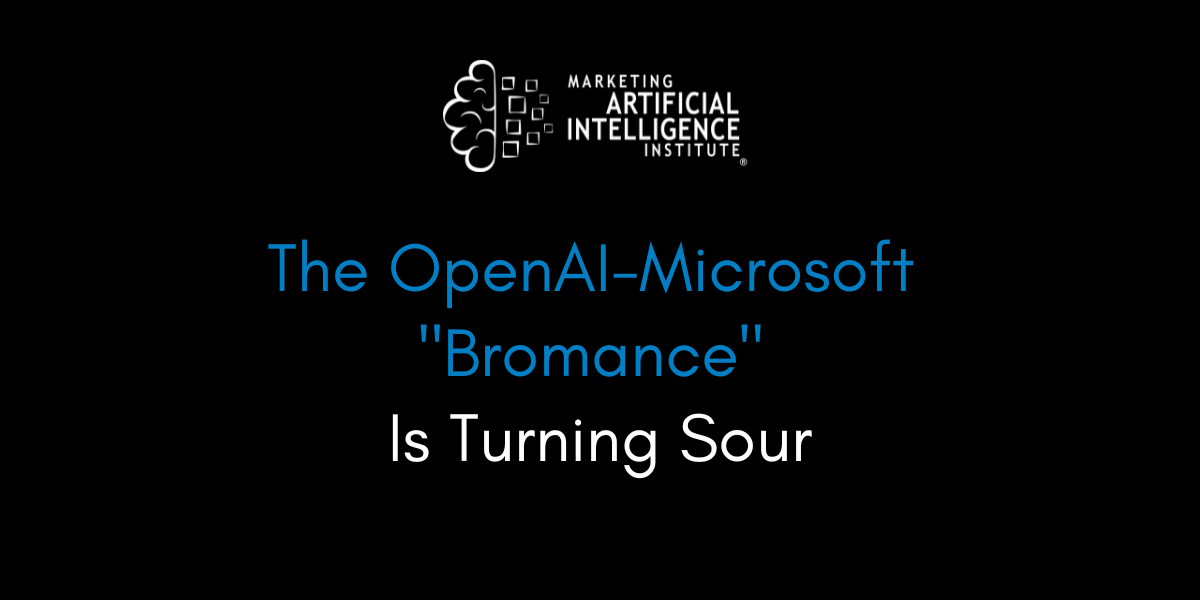OpenAI CEO Sam Altman used to call his company's partnership with Microsoft "the best bromance in tech."
But according to new reporting from The New York Times, that relationship has grown increasingly strained—and it all comes down to computing power, control, and the race to artificial general intelligence (AGI).
The tension could reshape the future of AI development.
How?
I spoke to Marketing AI Institute founder and CEO Paul Roetzer on Episode 120 of The Artificial Intelligence Show to get the scoop.
Trouble in Paradise
It all started off well enough.
Microsoft invested a staggering $13 billion in OpenAI, providing essential funding and computing power to help the company grow. (A close partnership that led Altman to his “bromance” quote.)
But, according to the Times, after OpenAI's board briefly ousted Altman last November, Microsoft started denying OpenAI’s requests for more resources.
“Over the next few months, Microsoft wouldn’t budge as OpenAI, which expects to lose $5 billion this year, continued to ask for more money and more computing power to build and run its A.I. systems,” says the Times.
It’s possible this is intentional, says Roetzer.
“It seems like OpenAI thinks they’re slow-playing them on compute access, so they can build their own internal competing tools and not be reliant on OpenAI anymore.”
At the same time, Microsoft appears to be hedging its bets:
- In March, Microsoft invested at least $650 million to acquire most of the staff from Inflection, an OpenAI competitor
- Inflection's former CEO, Mustafa Suleyman, now oversees a new Microsoft AI group that could potentially replace OpenAI's offerings
- Microsoft has officially begun listing OpenAI as a competitor in earnings reports
This has caused even more friction, with OpenAI executives and employees expressing frustration over Suleyman's position and concerns about technology sharing between the companies.
This tension with Microsoft comes at a critical time for OpenAI.
The company is set to lose a whopping $5 billion this year. As we get closer to GPT-5, the company has an urgent need for money and compute, which is why it recently broadened its investor base and raised $6.6 billion. (In fact, the Times reveals, OpenAI was initially trying to raise billions from Microsoft in 2023.)
Not to mention, OpenAI is trying to navigate a complex transition to a for-profit structure and faces growing competition from ex-employees like Ilya Sutskever and Mira Murati who are starting AI ventures of their own.
In response, OpenAI has been reportedly attempting to renegotiate or restructure the deal it has in place with Microsoft to gain more leverage over the tech giant.
The Hidden "AGI Clause"
And that leverage may come in a strange form.
“Microsoft seems to have all this leverage,” says Roetzer. “But then the most fascinating part of the [New York Times] article brings back a unique nuance of the relationship that some people maybe either forgot or didn’t know: The [existing] contract is void if OpenAI achieves AGI.”
The original contract between OpenAI and Microsoft contains a critical clause: If OpenAI achieves AGI, Microsoft's access to OpenAI’s technology becomes void. Even more importantly, OpenAI's board gets to decide when AGI has been achieved.
“OpenAI seems kind of helpless in this scenario relying on Microsoft and their contract, but they have this trump card,” says Roetzer.
What This Means for AI's Future
The tensions between OpenAI and Microsoft highlight a crucial dynamic in today's AI landscape: The race to AGI is also a race for independence and control.
This complex relationship may actually accelerate the development of AGI—not necessarily because the technology is ready, but because the business dynamics might demand it.
"Maybe we're going to get to AGI in society just because OpenAI wants out of their contract with Microsoft,” says Roetzer.
Mike Kaput
As Chief Content Officer, Mike Kaput uses content marketing, marketing strategy, and marketing technology to grow and scale traffic, leads, and revenue for Marketing AI Institute. Mike is the co-author of Marketing Artificial Intelligence: AI, Marketing and the Future of Business (Matt Holt Books, 2022). See Mike's full bio.


